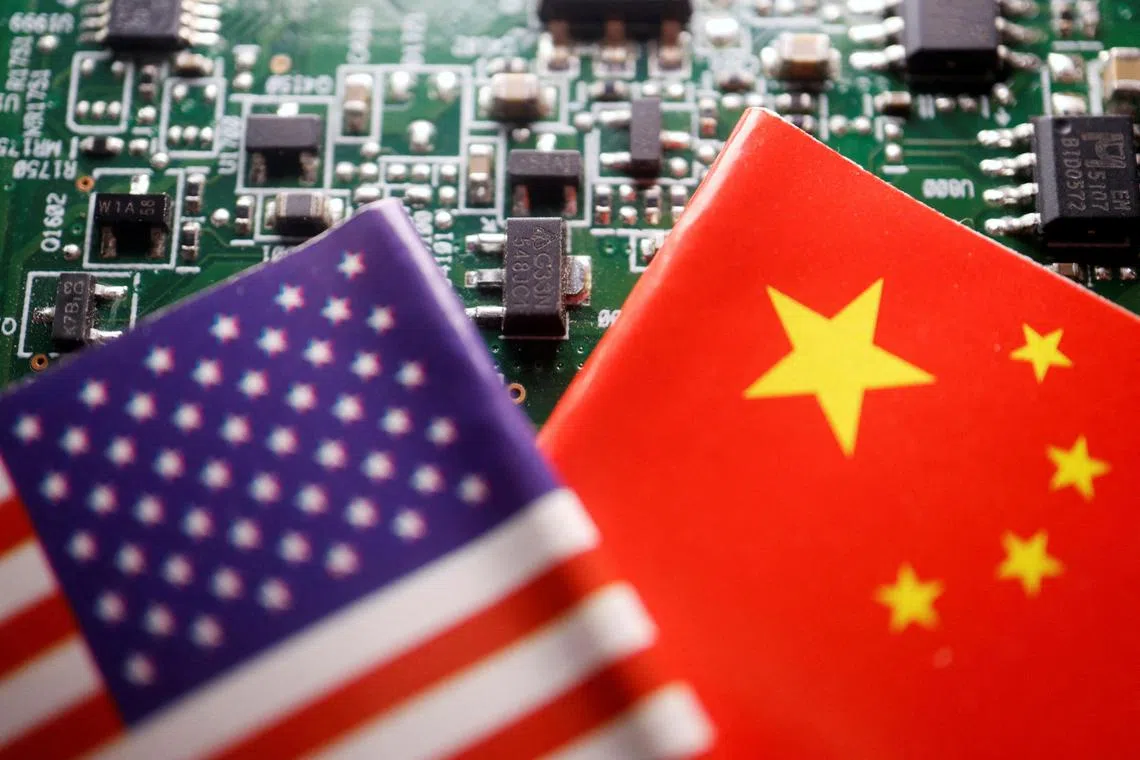China move to curb exports of two chipmaking metals escalates supply worries
Sign up now: Get ST's newsletters delivered to your inbox

China and the United States are battling for technological dominance in everything from quantum computing to AI and chip manufacturing.
PHOTO: REUTERS
BEIJING – A move by China to restrict exports of some metals widely used in semiconductors, electric vehicles and high-tech industries has ramped up a tech war with the United States and could potentially cause more disruption to global supply chains.
China’s Commerce Ministry said it would from Aug 1 control exports of eight gallium products and six germanium products to protect the country’s national security and interests, a move analysts saw as a retaliatory action in response to escalating efforts by Washington to curb Beijing’s technological advances.
Companies are reacting to the abrupt news announced on Monday, with one US semiconductor wafer manufacturer quickly saying it was applying for export permits to assure investors.
A China-based germanium producer told Reuters that inquiries from abroad and prices had surged overnight.
“China has hit the American trade restrictions where it hurts,” said Mr Peter Arkell, chairman of the Global Mining Association of China.
“Gallium and germanium are just a couple of the minor metals that are so important for the range of tech products, and China is the dominant producer of most of these metals. It is a fantasy to suggest that another country can replace China in the short or even medium term,” he added.
Gallium, germanium and other minor metals are widely used in wide-bandgap semiconductors in communication equipment, solar panels and electric vehicles.
China is the dominant producer of gallium and germanium.
In 2022, top importers of China’s gallium products were Japan, Germany and the Netherlands, news website Caixin said, citing Customs data. Top importers of germanium products were Japan, France, Germany and the US, it added.
Supply disruption worries
Japan warned it will oppose any violations of World Trade Organisation (WTO) rules and other international agreements.
“If any measures are unfair towards Japan in the light of international rules such as those under the WTO, we will act accordingly,” Trade Minister Yasutoshi Nishimura told reporters.
Tokyo does not consider China’s curbs as a reaction to Japan shoring up its licensing requirements on chipmaking equipment, he said.
US semiconductor wafer maker AXT, which has manufacturing facilities in China, said that its Chinese subsidiary Tongmei would immediately apply for permits to keep exporting gallium and germanium substrate products from China.
“We are actively pursuing the necessary permits and are working to minimize any potential disruption to our customers,” said AXT chief executive Morris Young.
A manager at a China-based germanium producer said his company had received several queries from buyers in Europe, Japan and the US hoping to stockpile the product ahead of the export controls taking effect.
The buyers were anticipating it could take as long as two months to obtain licence permits for exports.
“Offer prices in the domestic market and the export market have increased to 10,000 yuan (S$1,870) per kg and over US$1,500 (S$2,024) per kg, respectively,” he added.
While the industry had expected to see some export controls for these metals, the timing had caught it by surprise, he said.
“Some downstream users have locked in long-terms sales contracts for the coming two to three years and they are vexed about a possible jump in raw material prices, as it raises their production costs and may cause them losses,” he said, declining to be named citing the sensitivity of the matter.
Shares in some metal producers surged on Tuesday, with Yunnan Lincang Xinyuan Germanium Industry jumping 10 per cent by the daily upper limit, and Yunnan Chihong Zinc and Germanium Company climbing 7 per cent.
Escalation risk
China’s controls come as Washington mulls new restrictions on the shipment of high-tech microchips to China, following a series of curbs in recent years.
The US and the Netherlands are also expected to further restrict sales of chipmaking equipment to Chinese chipmakers this summer, part of efforts to prevent their technology from being used by China’s military.
Beijing last made a retaliatory move against US pressure on chips in May, when it banned some domestic sectors from purchasing products from US memory chipmaker Micron.
Jefferies analysts said they saw the export controls as China’s second and much-bigger countermeasure in the US-China tech war after the Micron ban, and also as a likely response to potential US tightening of an artificial intelligence chip ban
“The risk of a rapid escalation of US-China tension is not small,” they added.
“If this action doesn’t change the US-China dynamics, more rare earth export controls should be expected.” REUTERS


